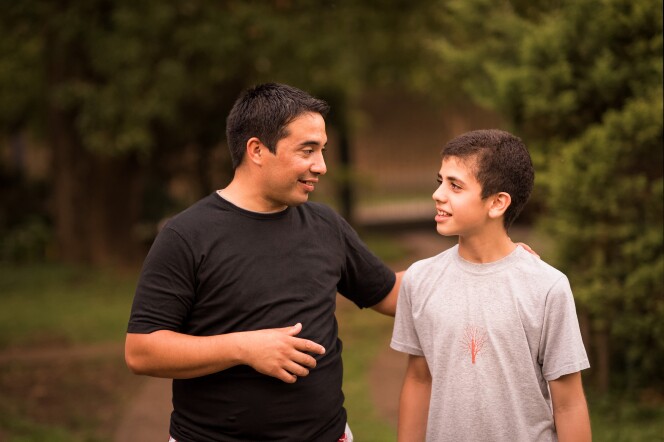Missionary service for young adult members of the Church has undergone some important changes over the last several years, including new allowances for missionaries to call home weekly, expanded opportunities for Church service missionaries, and many adjustments incident to the global pandemic.
These changes may make it possible for more young members of the Church to serve missions, which for decades has been a rite of passage into Latter-day Saint adulthood that many parents desire for their children. Because the decision to serve a mission carries with it significant cultural and spiritual implications, it’s important for parents to know how to talk with their children about this significant choice.
Five Ways to Talk about Serving a Mission
Earlier this week, Brother David T. Lisonbee, Young Men general advisory committee member, wrote an article for Church News about ways parents can talk to their sons about serving a mission.
“Some young men fear that fewer people want to hear about Jesus Christ and His restored gospel in the world today,” Brother Lisonbee writes. “That does not change the fact that there have never been more people who need to hear about Jesus Christ and the blessings of His Atonement.”
Brother Lisonbee gives these five ideas for parents as they talk to their sons:
1. Help him understand his divine identity.
Brother Lisonbee encourages parents to read Abraham 3:22–23 and Doctrine and Covenants 138:55–56 with their sons, and he quotes this statement from President Nelson: “Our Heavenly Father has reserved many of His most noble spirits—perhaps, I might say, His finest team—for this final phase. Those noble spirits—those finest players, those heroes—are you!”
2. Share the prophet’s invitation to serve.
President Nelson has taught: “My dear young brothers and sisters, these surely are the latter days, and the Lord is hastening His work to gather Israel. That gathering is the most important thing taking place on earth today. Nothing else compares in magnitude, nothing else compares in importance, nothing else compares in majesty. And if you choose to, if you want to, you can be a big part of it. You can be a big part of something big, something grand, something majestic.”
3. Talk honestly about missions and ask questions.
“Prayerfully ask questions that will focus on his needs, interests and righteous desires,” Brother Lisonbee writes. “Then, truly listen and ponder his answers.”
4. Encourage him to receive and study his patriarchal blessing and ponder its meaning and power.
Parents can “assure him that patriarchal blessings contain personal revelation from his Heavenly Father, who knows his strengths, weaknesses and eternal potential.”
5. Offer to fast and pray with him.
“Encourage your son to prayerfully seek to find the courage and strength to do what Heavenly Father and the Savior would have him do with respect to serving a full-time mission,” Brother Lisonbee writes.
What If My Child Decides Not to Serve?
Some young men and women will choose not to serve a mission immediately after becoming eligible, and some may choose not to serve at all. “Of course, it is vital to remember that your son has agency,” Brother Lisonbee writes. “He must feel of your love and support regardless of his choice. There are also opportunities to serve at different ages. If he is not feeling ready to go at age 18, it does not mean he can’t prepare and determine to go in coming years.”
According to Patrick Mason, Latter-day Saint scholar and author of Planted: Belief and Belonging in an Age of Doubt, “Those of us who have been on missions know for the most part how extraordinary they are, so there’s a natural—and I think healthy—regret when someone chooses not to have that kind of experience that was so powerful in shaping ourselves.”
Mason spoke to LDS Living in 2019 about how parents and others can respond when a loved one chooses not to serve. He says that Latter-day Saints may want to shift the way they think about other’s choices of whether or not to serve.
“Sometimes we fixate on a particular aspect of a person’s life, especially those things that are marked with achievement, like going on a mission or going to the temple or marrying in the temple,” Mason says. “Even if we want to avoid the checkbox mentality, there’s still a sense that these are the things that mark you as a good person, good Church member, etc.
“We have to resist the temptation to reduce people to those markers of achievement and [instead] focus on all the wonderful things about that person, all the gifts they have, all the things that they can do. Rather than focusing on what they don’t do, instead focus on what they are doing and what they can do and their potential.”
There are many reasons a young adult may choose not to serve a mission. For example, one young man, Tyler,* told LDS Living that when he chose not to serve, it was not because he was scared of the work. It wasn’t that he didn’t have a testimony. It wasn’t that he was going to attend college first. It wasn’t that he was somehow unworthy or unready. He had prayed about a mission and received an answer. In a conversation with his father, he recalls, “I said, ‘I just don’t feel the need to go.’”
Another young man, Andrew,* told LDS Living that when he turned 17, he became annoyed when people would say to him, “When you go on a mission…,” simply assuming he would serve.
“I didn’t have a testimony of my own,” Andrew says. “Despite praying and reading scriptures, I didn’t know if the Church was true, and I didn’t like people planning out two years of my life for me. Nobody ever asked me what I wanted.” At 19, Andrew joined the army instead.
Parents and others may be tempted to make assumptions about a person’s decision to not serve a mission—for example, many conjecture that a lack of worthiness is the cause.
“We can’t assume everything is about worthiness,” Mason says. “Just because they don’t go on a mission doesn’t mean they are doing something wrong. Sometimes these kids feel so pressured by the culture that they feel like they can’t talk to anybody about how they’re feeling.”
When ward members made assumptions about Andrew’s worthiness and gossiped about his decision, it took a major toll. “It was hurtful to me and my family, and it didn’t make me want to ever come back to church,” he says. And for 10 years, he didn’t come back. It wasn’t until his late 20s that he began attending church again, having eventually overcome the lingering feelings of anger and shame.
Looking back now as an active member of the Church, Andrew shares what his experience taught him about what parents can do to support young men and women who choose not to serve.
“Don’t assume anything,” Andrew says. “Ask them how they feel about serving a mission, and allow a safe space for them to express their concerns without disappointing everyone.” He also reminds parents that “a lot of great people don’t serve missions and still are strong members of the Church.”
Mason says that when a child decides not to serve, one of the most important things is to provide nurturing environments for their testimonies to grow. “Maybe they go on a mission a few years later, maybe they don’t go at all,” he says. “But we want them to be active members of the Church for the long haul and not to feel so alienated because they didn’t have this experience that they just quit altogether.”
Read more here for additional stories of young members of the Church who chose not to serve and how their families learned from the experience.
*Names have been changed


